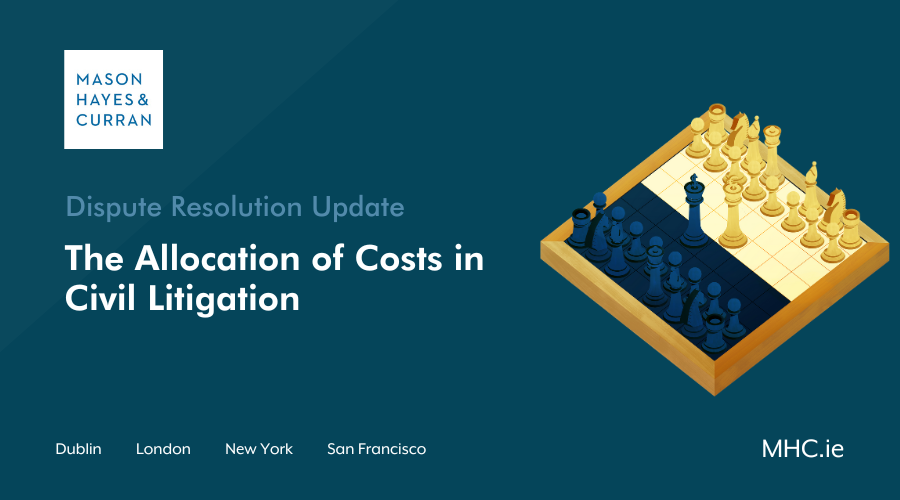
A recent decision from the Court of Appeal regarding costs in litigation has confirmed the correct starting point when making costs orders. In doing so, the decision has made clear the proper approach under Section 169(1) of the Legal Services Regulation Act 2015 which puts the allocation of costs in civil proceedings on a statutory footing. Gerard Kelly and Gearoid Carey, Partners, review the implications of this decision.
The Court of Appeal recently addressed a costs order made in the context of High Court proceedings which was the subject of an appeal and cross-appeal. The proceedings concerned whether a costs order should be reduced because a preliminary point was not raised prior to the full trial.[1] In doing so, it considered the proper approach to adopt with regard to the award of costs in light of the Legal Services Regulation Act 2015 (2015 Act). The 2015 Act put the principles applicable to the award of costs on a statutory footing. The decision confirms the correct starting point and the approach the courts should take when addressing an award of costs. In short, a party who is entirely successful is entitled to their costs, subject to the entitlement of the court to order otherwise if the circumstances of the case and conduct of the proceedings warrant it.
Background
In the High Court, a costs order had been made in favour of the defendant, the Minister for Public Expenditure (Minister), who had successfully resisted a public procurement challenge. Unusually, that challenge had been brought by an entity which had not actually submitted a tender in the disputed process. The proceedings were determined on a preliminary standing or eligibility point in accordance with the relevant regulations, namely that because the entity had not participated in the tender it was not an eligible person to challenge it. Accordingly, the High Court did not find it necessary to address the three substantive claims raised by the challenging entity which took up most of the time at trial. The decision on the merits was upheld on appeal.
When it came to the award of costs, the High Court awarded 50% costs to the Minister. The principal reason for the reduction was that, although the Minister did succeed in having the challenge dismissed, he had failed to bring a motion to have a preliminary legal point determined before the trial. In particular, the relevant provision of the Rules of the Superior Courts (RSC), Order 84A, rule 6(2), provides for the possibility of a motion to dismiss proceedings on the grounds of eligibility. However, no such application was brought by the Minister here and the case was determined on that preliminary point following a full trial. This, felt the trial judge, warranted the Minister, notwithstanding the successful outcome, being awarded only 50% of his costs.
The Minister’s appeal raised the question as to whether a party who participates in and successfully defends a unitary trial is entitled to their costs. This is based on the premise that the award was improperly too low, where, with the benefit of hindsight, they could have successfully applied to have a particular point tried as a preliminary issue. A unitary trial is one in which the plaintiff litigates damage and liability at the same time. The challenging entity cross-appealed the costs award on the basis that the trial judge’s apportionment of costs was too generous and that, when the time and expense of dealing with the evidence regarding other issues was actually taken into account, a more appropriate starting point was around 10% instead of the 20% the trial judge started with.
Trial court reasoning
In determining that the Minister should only be entitled to 50% of his costs, the trial judge referenced the importance of cost orders encouraging efficiency and, in the context of Section 169, stated that it provided “a powerful financial incentive for litigants to be as efficient as possible with the use of court time”. He further stated that “it is no longer sufficient for the [winning party] to have been entirely successful in litigation. The party must have conducted her case in the most cost-effective manner possible failing which she is unlikely to get her full costs.” Further, the wording of Section 169(1) meant that a court “must consider in every costs application… whether… the winning party conducted the case in a manner which justifies a lesser award.”
The Court of Appeal, as held by Ms Justice Donnelly, concluded that a close analysis of the structure of the High Court ruling and its content revealed that the trial judge “was clearly holding that the court was obliged to ask in every case where costs are at issue ‘have the parties conducted the case in the most cost-effective way possible’.” Accordingly, the Court of Appeal observed that the primary issue for it to consider was “whether there is a requirement of the parties to conduct litigation in the most cost-effective manner possible.” It alternatively framed the main issue for its determination as being whether the trial judge was correct in holding that the question of “whether the litigation was conducted in the most cost-effective manner possible was the starting point in considering costs?”
Applicable law
The Court of Appeal’s analysis of this issue began with the 2015 Act. It noted that Section 168 gave a discretionary power to the courts to award costs, which has been acknowledged to be “very wide and encompasses significant flexibility.”[2] It went on to note that Section 169(1) itself addressed the situation of a party who was entirely successful and provides:
“A party who is entirely successful in civil proceedings is entitled an award of costs against a party who is not successful in those proceedings, unless the court orders otherwise, having regard to the particular nature and circumstances of the case, and the conduct of the proceedings by the parties.”
The Court of Appeal then considered the decision of Mr Justice Murray in Chubb v The Health Insurance Authority[3] where he reviewed the general principles applicable to costs and identified the parallels between the relevant provisions of the 2015 Act and RSC Order 99. The sequencing of those principles confirms the general discretion regarding costs, but the obligation to consider Section 169(1) which starts with the entitlement of an entirely successful party to succeed in an award of costs unless the court orders otherwise. As put by Ms Justice Donnelly, “it is only if the court is determining to order otherwise that the court has to have regard to the other factors…” and “nowhere … does Murray J. state that it is mandatory to ask in every application for costs under the section whether the parties have conducted the case in the most cost-effective way possible.” Whilst she noted that cost-effectiveness was not directly mentioned by Mr Justice Murray, she stated that she did not doubt that it was in a general sense a rationale behind many of the identified factors.
In the context of what the 2015 Act actually provided, the Court observed that if the trial judge was correct that the 2015 Act was the impetus for the proposition that the starting point for any costs order involved the review of the wining party’s conduct to ensure the litigation was conducted in the most cost-effective manner possible, one would expect that such a departure from the general proposition that costs follow the event would be expressly stated.
Analysis
The question of whether the Minister had been ‘entirely successful’ was not at issue in the appeal and the Court of Appeal judgment ostensibly proceeded on the basis that he was ‘entirely successful’. In that context, the court held that the trial judge was incorrect in ruling that whether the proceedings were conducted in the most cost-effective manner possible was the starting point of the exercise of the court’s discretion to award costs under the 2015 Act. Rather, Ms Justice Donnelly stated that “the starting point must be that an entirely successful party is entitled to an award of costs”. Here, the trial judge had commenced his calculation of the costs as if that did not apply such that he built upwards to a percentage of costs that he ought to order rather than seeing if there was a reason why the entirely successful party ought not be awarded their full costs. She stated that:
“Approaching costs from the starting point that the entirely successful party is entitled to the full costs is consistent with the statute, the rules and with the decision of the Court of Appeal in Chubb… it is imperative that each court approaches the issue of costs in the manner laid down by the relevant legal provisions… The general rule however is that a losing party bears the burden of persuading the court that the entirely successful party is not entitled to an award of costs."
The Court of Appeal went on:
“There is nothing on the face of the 2015 Act that supports the contention that it brought about a change in the law that a successful party would only be entitled to a full award of costs provided it had conducted its case in the most cost-effective manner possible. That goes far beyond the concept of costs reasonably incurred or behaviour that was reasonable in the circumstances.
Therefore, the trial judge was incorrect in posing the question in terms of whether the litigation had been conducted in the cost cost-effective manner possible. Instead, he should have asked whether he was satisfied that the Minister had behaved unreasonably in failing to bring a preliminary motion on the eligibility point.”
In answering that question, the Court of Appeal was satisfied that the Minister had not acted unreasonably and that the trial judge, in considering if the Minister had acted in the most cost-effective manner possible, had asked himself the wrong question. On that basis, the cross-appeal was dismissed and the appeal was allowed. The Court of Appeal expressed the preliminary view that the Minister was entitled to all of his costs but directed that a hearing on that could be convened if the challenger sought to contend otherwise.
Conclusion
The case usefully reviews the essential principles applicable to the award of costs in civil cases in Ireland. Although costs are at the discretion of the court, the starting point in the exercise of that discretion is that an entirely successful party is entitled to costs. An order to a different effect may be made having regard to the circumstances of the case and conduct of the proceedings, including the specific factors identified in Section 169(1). Fundamentally, however, and whilst it may be part of the rationale for certain of the specific factors, there is no requirement that an entirely successful party needs to demonstrate that it conducted the litigation in the most cost-effective manner possible.
For more information and expert advice on bringing such claims, contact a member of our Commercial Disputes team.
The content of this article is provided for information purposes only and does not constitute legal or other advice
[1] Word Perfect Translation Services Ltd v Minster for Public Expenditure and Reform [2023] IECA 189
[2] E&F v G&H [2021] IECA 108
[3] [2020] IECA 183







